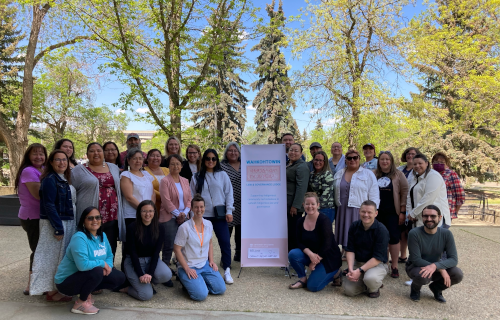A look at the Wahkohtowin Lodge’s spring Community Research Methods workshop
Lauren Bannon - 14 July 2022

Between May 31 - June 3, 2022, 28 participants representing over 13 Indigenous communities from across Canada – as well as members of the Faculty of Law and Edmonton’s Bent Arrow Society – participated in a workshop presented by the Faculty’s Wahkohtowin Law and Governance Lodge, a research unit dedicated to upholding Indigenous laws.
This hands-on workshop – facilitated by professor Hadley Friedland (academic director of the Lodge) and Koren Lightning-Earle (legal counsel for the Lodge) – touched on topics such as the nature of law, research ethics and effective community engagement.
“The goals of the workshop were to introduce a range of research methods to support the work Indigenous communities are doing to revitalize and develop their own laws and build connections between communities,” says Friedland.
“Workshop participants appreciated the conversations and the range of tools for their Indigenous law goals from this workshop. They expressed feeling inspired, hopeful and more confident going forward. Our team felt the same way.”
One activity presented at the multi-day event was the Tully Wheel/Making Connections exercise. Drawing on the work of political philosopher James Tully, participants mapped out ways in which colonialism, oppression, racism and injustice are experienced in both Indigenous communities and the wider community. Participants were then asked to contextualize both the work and goals of rebuilding Indigenous laws and then look at how different actions can create real change.
A range of Indigenous law research methods was presented at the workshop, such as linguistic methods (which draw on legal principles from language) and the Lodge’s “Wisdom Workshop” method (which draws on the shared wisdom of the group on a particular subject).
The primary method shared in the workshop is the narrative analysis method (also known as the ILRU method), which was developed by Friedland and the University of Victoria’s professor Val Napoleon. This method focuses on Indigenous ways of using stories for thinking and adapts common-law legal analysis to draw out Indigenous legal principles from a wide variety of publicly available resources, including published stories, recorded historical accounts and oral histories. For over a decade, Indigenous communities have been using this method to successfully identify and articulate their own legal principles.
“This workshop was all about Indigenous communities leading their own research, based on their own vision and inner strengths. It’s an honour to contribute to this important work, and we always learn so much and appreciate the relationships built,” says Friedland.